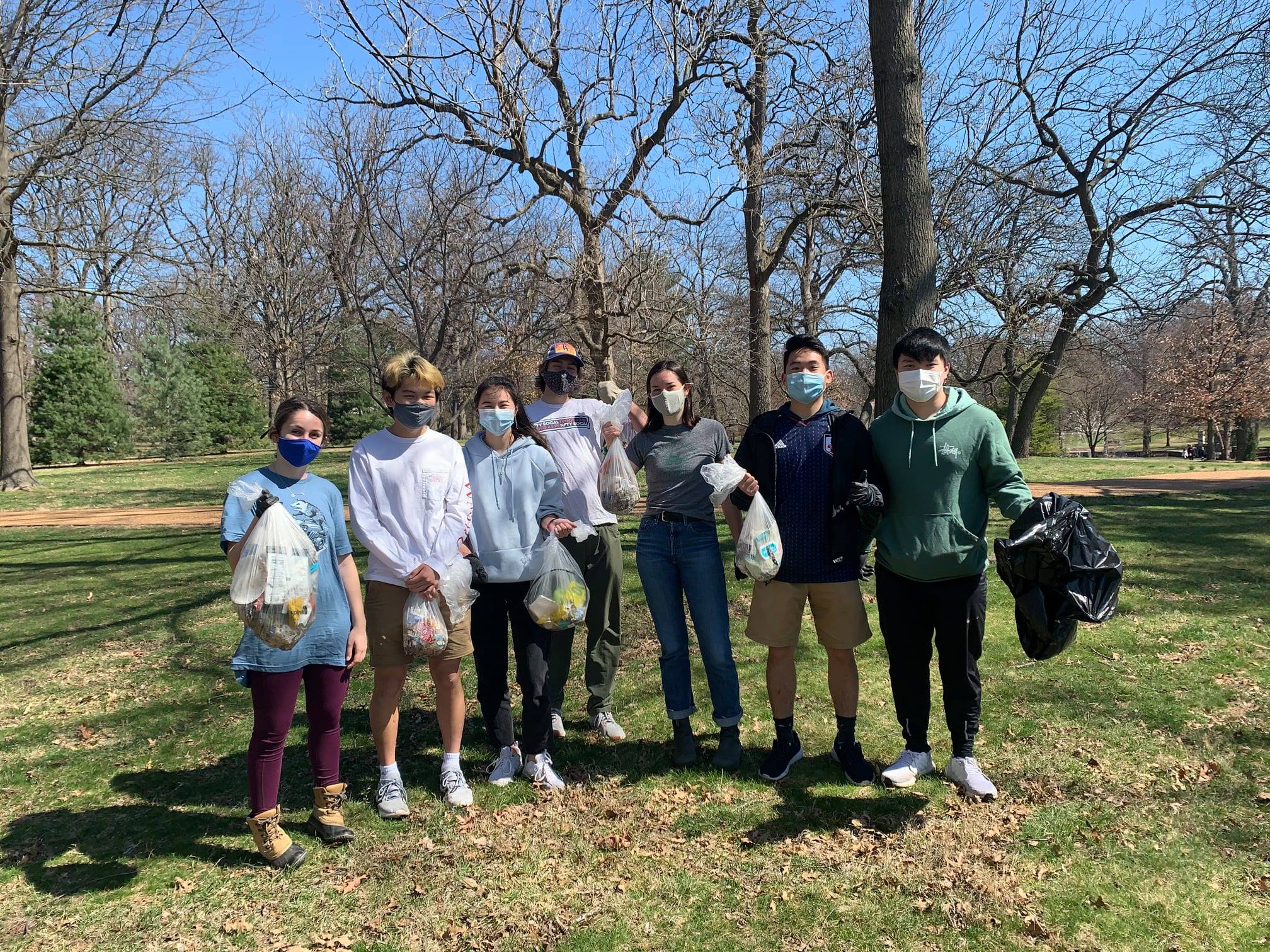Scene
Clean our Green: WU senior sets out to complete mammoth park clean-up project
Over the last year, the safest place for gatherings has been the great outdoors. It’s an inconvenience to be sure, but perhaps also a blessing. Students at Washington University, with the abundance of surrounding nature and proximity to Forest Park, are uniquely situated to take advantage of green urban spaces.
The evidence is not just anecdotal—scientifically conducted studies have shown the benefits of green space on physical and mental health.

Volunteers with Clean Our Green have completed eight park cleanups so far, including one at Oak Knoll Park in Clayton. (Courtesy of Lucas Dionisopoulos)
But parks cannot take care of themselves. While the Wash. U. environment has a dedicated team behind it, most smaller parks in St. Louis do not.
Senior Lucas Dionisopoulos set out to fix this imbalance. A Finance and Computer Science major and former president of the Beekeeping club, he also is the founder of ‘Clean Our Green,’ a student-led project to clean up green spaces in St. Louis.
“It probably started when I was driving up to northern St. Louis, and saw all these parks with a ton of trash in them,” Dionisopoulos said. “Then I thought, in 2020 there was this big divide between people who had access to green space and those who didn’t. Ladue and Clayton, they’re doing great with their parks, they have a ton of resources. If you go up to Normandy, Pine Lawn, Delwood—those are towns which don’t have a lot of resources. Volunteering is super helpful for them and it makes a big impact.”
Dionisopoulos also sensed a frustration on campus from people who wanted to help but were unaware or unsatisfied with opportunities available to them. In this setting, Lucas sensed an opening. “There’s volunteers, there’s a problem, let’s see how we can do this together,” he said.
St. Louis is, unfortunately, uniquely desperate for help with park maintenance. This is due in part to the archaic practice of separating between St. Louis county and city—a legacy that has come under fire in recent years. Today, St. Louis remains fractured into 88 municipalities, which poses a challenge when establishing distinct departmental services and parks departments city-wide.
St. Louis is a big city made up of several smaller municipalities, and those are full of little parks. Volunteering efforts are essential to maintaining them, especially for those areas without the resources to do it themselves.
“Some of these towns really have like 300 people in them,” Dionisopoulos said. “They are in charge of putting up all these resources, but the overhead for starting those departments is pretty high. If you look at a place like Pine Lawn, Missouri, they don’t have a parks department, and they have four different parks.”
A park cleanup can be big or small. Trash pickup is always a component, but mulching, invasive plant removal and grill maintenance are all needed. Honeysuckle, a fast growing non-native shrub loved by bees but hated by park planners, poses a particular challenge for cleanup efforts—the only way to combat it is a chainsaw powered “honeysuckle chop.”
Clean Our Green has a stated goal of 40 park projects by the end of finals week, and 80 by the end of the summer. Their online tracker has already recorded eight park cleanups, just a few weeks after the project was published.
The cleanup plan involves not only a dedicated cleanup crew, but also counts on other groups at Wash. U. getting involved. Any club on campus can easily sign up for a weekend cleanup. 50 projects have already been sourced from 19 municipalities, waiting for volunteers to fill them. Networking and connecting with the right people in these areas also enables such a project to keep living even after the founders are gone.
Networking with small municipalities sometimes goes beyond park cleanup. Dionisopoulos recently had the opportunity to participate as a volunteer in the Easter celebrations at Rock Hill. While trying to source park cleanups, he got recruited to walk as the Easter Bunny in their parade, riding on the local fire-truck.
Dionisopoulos welcomes anyone with a free weekend to connect with Clean Our Green through email or Facebook. The project will provide any equipment needed, and just one hour of picking up trash will help provide a clean green space for the community to enjoy. Any excuse to get outside is a good one, but going out to improve the outdoors is even better.
